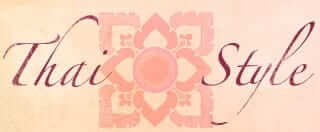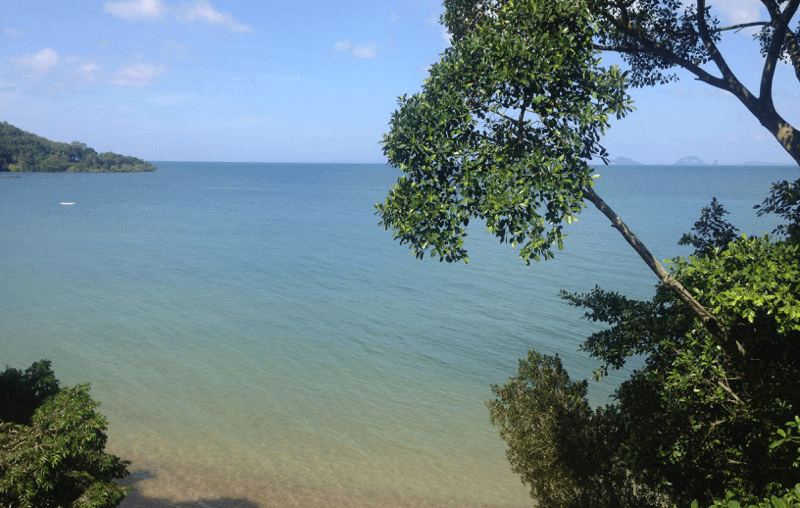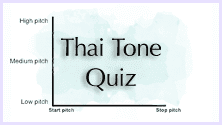Learn Thai with Kruu Jiab
Audio Practice
Proper Slow Pronunciation:
Requested file could not be found (error code 404). Verify the file URL specified in the shortcode.
Proper Fast Pronunciation:
Requested file could not be found (error code 404). Verify the file URL specified in the shortcode.
Informal & Fast:
Requested file could not be found (error code 404). Verify the file URL specified in the shortcode.
ท้องฟ้าสีคราม
ทะเลสีเขียวใส
ต้นไม้เขียวขจี
หาดทรายสะอาด
เห็นเขารำไร
ที่นี่(คือ)เกาะจำ
Tórng~Fáa Sĕe Kraam
Tá-lay Sĕe Kĕaw Săi
Dtô’n~Mái Kĕaw~Kà-jee
Hàad~Saai Sà–àad
Hĕ’n Kăo Rum-rai
Têe~Nêe (Kuee) Gò’ Jum
sky + colour + indigo blue
sea + colour + green + clear/transperent
tree/plant + verdant (lush and green)
beach~sand + be clean
be able to see + mount/mountain + indistinct
place~this + be; is/am/are (fact) + island + …(name)…
Indigo blue sky
Clear green sea
Lush green plants
Clean sandy beaches
Indistinct mountain view
This is Koh Jum
Pronunciation Points:
1. Formal situations such as business correspondences, TV host/reporters, etc., Thais usually speak with formal language and with proper pronunciation.
2. Informal situations in everyday life such as speaking with acquaintances, friends and family or even with strangers, Thais usually speak with informal language by shortening the proper/grammatical correct sentences e.g. dropping the verb คือ : Kuee from the sentence ‘ที่นี่คือเกาะจำ : Têe~Nêe Kuee Gò’ Jum‘, changing the pronunciation of the letter ร : R (Rolling tongue) to ล : L and omitting the cluster sound in consonant cluster syllables like คราม : Kràam to Kàam.
Language Points:
1. Indicating the colour of something;
– In Thai, มี : Mee is used to indicate the existence of colour. For example, วันนี้ ท้องฟ้ามีสีคราม : Wun~Née Tórng~Fáa Mee Sĕe Kraam = The sky has got an indigo blue colour today. In English, the word ‘have’ and ‘is’ are used in different situations. e.g. ‘The pen is red.’ and ‘She has got red hair.’
– When indicating colours, the word ‘ สี : Sĕe = colour’ is usually used in front of the name of the colour, e.g. สีแดง : Sĕe Daeng = colour + red (name of colour) = red colour.
– When clarifying the colour of something, the word ‘ สี : Sĕe = colour’ can be added in between or cut off. e.g. ปากกาสีแดง : Bpàak-gaa Sĕe Daeng = pen + colour + red ; ปากกาแดง : Bpàak-gaa Daeng = pen + red = red pen.
2. Modifying/Clarifying the quality of something;
– When modify or clarify the quality of something, the modifier (adverb/adjective) is used after the word it clarifies. For example, ‘ หาดทรายสะอาด : Hàad~Saai Sà–àad = beach + sand + clean’ unlike English sentence structure ‘clean sandy beach’
Vocabulary:
ท้องฟ้า : Tórng~Fáa = [noun] sky(combined from the word ‘ ท้อง : Tórng = [noun] stomach [noun] vast area’ and ‘ ฟ้า : Fáa = [noun] light blue, sky blue [noun] sky)
สี : Sĕe = [noun] colour
คราม : Kraam = [noun] indigo blue
ทะเล : Tá-lay = [noun] sea
เขียว : Kĕaw = [noun] green
ใส : Săi = [modifier] transparent, clear
ต้นไม้ : Dtô’n~Mái = [noun] tree, plant
(combined from the word ‘ ต้น : Dtô’n = [noun] stem, trunk [noun] beginning [noun] origin [noun] upper [classifier/unit word of plants or trees] ‘ and ‘ ไม้ : Mái = [noun] wood, lumber, timber, plank [noun] plant, tree)
(เขียว)ขจี : (Kĕaw)~Kà-jee = [noun] verdant
หาดทราย : Hàad~Saai = [noun] sandy beach
(combined from the word ‘ หาด : Hàad = [noun] beach’ and ‘ ทราย : Saai = [noun] sand)
สะอาด : Sà–àad = [modifier] be clean, be immaculate, be spotless, be flawless, be pure, be unpolluted, be untainted
เห็น : Hĕ’n = [verb] be able to see, to have a sight of
เขา : Kăo = [noun] mount, mountain, hill [noun] horn [noun] dove [personal pronoun] he, she, him, her, his, hers
รำไร : Rum-rai = [modifier] indistinctly, dimly, faintly, obscurely
ที่นี่ : Têe~Nêe = [noun] here, this place
(combined from the word ‘ ที่ : Têe = [noun] place’ and ‘ นี่ : Nêe = [distance modifier] this)
คือ : Kuee = [verb] be; is/am/are (used to indicate the fact of being something)
เกาะ : Gò’ = [noun] island, isle [verb] to hold, to cling
Post By ครูเจี๊ยบ : Kruu Jíab
Follow Kruu Jiab for free Thai language updates here



